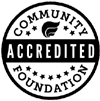Create a Giving Plan
Consider creating a charitable giving plan as part of your family’s overall financial plan.
You can donate during your lifetime or by bequest. Your professional advisor or our staff can suggest ways to structure and time your contributions to qualify for maximum tax advantage under federal law. Your options include outright gifts, remainder gifts and life income plans.
Outright Gifts
Outright gifts can include cash, securities, real estate, and life insurance.
Gifts of cash
Cash gifts are fully deductible up to 60% of the donor’s adjusted gross income in any one year. Deduction amounts exceeding this limit may be carried forward for up to five additional years.
Securities
Gifts of appreciated securities (bonds and stock, including stock in closely held companies) often provide important tax advantages. Their full fair market value is deductible up to 30% of your adjusted gross income. As with gifts of cash, deduction amounts exceeding this limit may be carried forward for up to five additional years. Another benefit is that you avoid the capital gains tax on the appreciated portion of the gift. Gifts of closely held stock enjoy the same tax benefits as with publicly traded stock.
Life insurance
If you name us as the owner and beneficiary of an existing or new life insurance policy, you receive an immediate tax deduction, which usually approximates the cash surrender value of the policy. All premium payments you make after that will be deductible as a charitable contribution.
Remainder Gifts
You may choose to leave charitable assets upon your death. You can use a variety of assets, such as pension plans, life insurance or the proceeds from the sale of a house, for charitable purposes.
Bequests
You can establish or add to your named fund in your will or trust through a bequest. Your gift can be used to accomplish almost any charitable goal:
- Creating an endowment for a particular charitable organization
- Leaving a family legacy, which allows children to continue their involvement in charitable grant-making
- Making scheduled grants for several causes that you support during your lifetime
Pension plan beneficiaries
A retirement plan is one of the best types of assets to transfer to charity because it produces taxable income. Most assets an heir inherits are free from income tax. However, an heir will pay income tax on disbursements from a decedent’s retirement plan such as a profit sharing plan, Section 401(k) plan or IRA. If you are going to make a charitable bequest, it is usually better to transfer the taxable assets subject to income tax to your fund at DCCF, and to transfer the assets not subject to income tax to heirs.
For large taxable estates, the combination of estate and income taxes will frequently exceed 75 percent of the total amount — even more if the generation skipping transfer taxes are triggered. At a cost to your heirs of only 25 percent of the fair market value of these type of assets, you could apply 100 percent of the assets to your charitable fund to accomplish your specific charitable objectives.
Life insurance beneficiaries
Perhaps you would like to contribute the proceeds of a life insurance policy to help the community, but you are not yet ready to give up ownership of the policy. By naming a community foundation only as beneficiary, you retain ownership of the policy and have access to the cash value as well as the right to change the beneficiary.
We encourage you to work with your lawyer or financial advisor as you consider these options. Our staff is experienced in the use of these giving vehicles and is eager to work with you and your advisor in this process.
Life Income Plans
Charitable remainder trusts
DCCF can assist you with charitable remainder unitrusts and annuity trusts, both of which pay lifetime income to you or other named beneficiaries.
Establishing a trust is simple. Cash or property is transferred to the trust. The income beneficiaries receive annually an amount equal to a fixed percentage of the trust’s fair market value (unitrust) or a fixed dollar amount (annuity trust). Upon termination of the trust, the assets are transferred to your charitable fund to support your charitable giving goals.
To explore which option may be best for you, ask your financial advisor.
|
For more information, contact Chip Blaser, Executive Director. |


